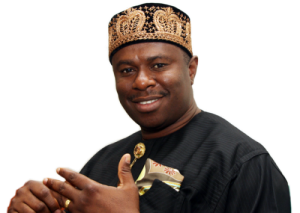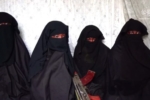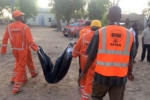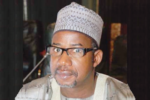Multitasking could best describe the routine of the Director General of the Nigerian Maritime Administration and Safety Agency, NIMASA, Dr. Dakuku Adol Peterside.
He speaks with Ahamefula Ogbu on the challenge of public perception of the agency, status of Tompolo’s contract, factors militating against cabotage implementation and the future of vessels acquisition fund.
What did you meet on ground when you assumed office as NIMASA DG?
I met an agency that has knowledgeable people but seemed to have the challenge of leadership vacuum, an agency that was misunderstood by Nigerians.
It was viewed as a cash cow, but NIMASA does not have the kind of money that people were made to believe. An agency that ought to play a critical role in the growth of the Nigerian economy had somehow veered off from its core mandate.
The moment we joined the NIMASA team, we decided to bring together all staff of the agency and stakeholders in the industry.
We sat, discussed, disagreed and agreed and came up with a roadmap to help NIMASA achieve its objective and make Nigeria a global voice in the maritime industry; that’s where we are.
What experience would you say you brought to the table?
I won’t give myself any particular credit but without a doubt, for me to be appointed by the President means I have some managerial skills which the President and his team considered that were needed to turn around a prime agency like NIMASA; so it would not be immodest to say that I and other executive directors of NIMASA came with that much needed management skills, a big picture of where the management leadership should be and a determination to fix the agency to play its regulatory and facilitation functions. We met wonderful people here who desire to work. They needed to be propelled to do what is right and again, to contribute their own quota to the development of the maritime sector of our economy.
Considering where you met NIMASA on assumption of duty and where it is now, what is your assessment of what has been put right?
I am not in a position to assess myself but if the signals I pick are right, people think that NIMASA is a bit more efficient now; that NIMASA has a clear vision of where it wants to go and a lot of work is being done to take NIMASA to that objective it has identified for herself. The stakeholders, if I listen to them, think the agency is a bit more responsive now. The agency is steering clear of politics and concentrating on its core mandate, those are some of the accomplishments that the feelers or signals I get from the industry reveal to me.
Is NIMASA going in the direction of your expectation?
Yes. Are we where we should be? The answer is no – Are we headed in the right direction? From my own assessment and understanding, yes; we are heading in the right direction. Are we moving as fast as we should? No.
How secure is the Nigerian waterways?
There are a lot of improvements but there is a lot of work to be done and because we recognise that there is a lot of work, we are doing a lot more collaboration with our partners both in the country and within the region. We are also working very hard to help the President achieve its new architecture the President has approved for maritime security. You will notice that recently, heads of government in Africa signed the African Charter on Maritime Security, Safety and Development because they also recognise that the blue economy has a role to play in terms of economic growth of our different nations; so NIMASA has an in-country responsibility as that agency that is responsible for maritime sector regulation. We have a role to play in the realisation of the charter that was signed by African heads of state as well as African integrated maritime strategy as well as ECOWAS maritime integrated strategy. So I think that today the Nigeria maritime domain is more secure than it was yesterday. It can only get better, it can’t get worse. The Navy is scaling up their game, NIMASA too is scaling up their own game; so working collaboratively, we are going to achieve more and I think we are already achieving more.
How soon will inland waterways transportation be boosted to reduce road traffic?
If we implement the new presidential architecture on maritime security and safety, I believe it will contribute substantially to boosting the inland waterways transportation subsector. I believe we already have a team in NIWA that is doing a great job, but again you need infrastructure, it is not enough that the waterways are safe; if you do not have the requisite infrastructure, you won’t grow that area. So we need infrastructure, we also need people to invest in acquisition of vessels, coastal vessels or vessels that would be used in coastal transportation; we also need the right regulatory framework in place. We have laws but that is not enough, we need proper regulatory framework to be in place. I think that all of those pieces are being annexed now and we will get it right.
What factors have you identified as militating against full implementation of the Cabotage law?
First, is in the area of ship building; we need to develop our steel and aluminum industry; without steel and aluminum, we would not be economically competitive to build ships in Nigeria. Second, is that we need to develop the skills and technical know-how to build vessels, Now, building vessels requires specialised skill. Apart from having steel and aluminum, we need specialised skilled men to build vessels. We are not building enough capacity in the area of having skilled men who can build vessels; the third thing is the issue of vessel finance; vessels cost a lot of money to build. Right now most of our financial institutions are not ready to invest in the long term, they prefer short term, make their money and exit the business. We must have a scheme in place that will encourage banks to invest long term in the area, if they do, we are likely going to see more vessels built in-country. The other issue is manning, we are already training more persons, so I believe in a few years to come, that gap would have been addressed. We will have Nigerians trained to man vessels that trade within our coastal and inland waterways. What of flagging of vessels? We too are making a lot of improvements and we are revolutionising our ship registry and it will be the preferred ship registry around this region. I don’t see any reason why people should not flag their ship Nigeria. We are providing a lot of incentives that will encourage local participation in inland trade and I believe if you put all these together there would be a boost and boom in the cabotage regime.
In terms of regulatory frameworks, what do you think should be done to make our ports attractive so Nigeria will stop losing vessels to neighbouring ports where goods are smuggled into the country?
Three most important things: one is that improve the turn-around time and you see improved patronage of our ports. If you are going to keep a vessel for 30 days before you can discharge cargo, they will prefer to go to ports where in 24 or 48 hours they have discharged and have a turn-around. Number two is that the number of agencies in our ports need to be streamlined and I think the ministry is taking that initiative and NPA also is keying in that initiative; we need to reduce the number of agencies in our ports and if possible, automate the process of clearing goods from our ports and finally, improve the infrastructure in our ports. If we do these three things and with the right regulatory framework in place it will again, enhance the usage of our ports.
What of port charges?
Well, when we say number of agencies, you know charges is not the prime thing that puts people away. It is good to streamline charges but most of the charges are the same everywhere. The key challenge is the turnaround time on our ports is fairly long. You have several agencies boarding your vessel and before you discharge, it takes very long.
You mentioned the fact that ship acquisition cost a lot of money but there are funds that were created for such a purpose. Why are intending ship owners not able to access the funds?
They will access the funds. We just don’t want it to go the way of earlier funds of that nature. Remember we had the ship acquisition and ship building fund which many Nigerians could not account for what happened to that fund. We had aviation fund which in some cases were abused. What we are doing is to review the guidelines and ensure the loopholes are blocked and make sure that in future, all those who will access the cabotage fund would apply it for the purpose which it is meant for and of course, Nigeria will derive the benefit for the utilisation of the CVFF, that is where we are and I think that we are on course.
How soon do we expect that such fund would be accessed by Nigerians?
Very soon.
Despite the provisions under the Cabotage law on ownership of vessels that would ply our inland waterways, why do we have cases of foreign vessels operating locally or vessels owned by foreigners operating locally where indigenous owners should operate?
There are a number of reasons for it. There a number of vessels with certain specifications that Nigerians don’t have, Nigerians don’t own such vessels and in such cases there is nothing you can do, you allow the foreign vessels trade within our coastal waters, if you don’t have that specification of vessels. There are also instances where we may have such specifications but for one reason or the other like if at a time, we don’t have people to man such a vessel, an area we are still having challenges but there are just few cases and we allow such vessels trade within our coastal waters.
Out of about 600 vessels on your register, only about 60 belong to Nigerians.
That’s not true at all.
What are the statistics?
Well, of the 600 on our register, at least 70 per cent are owned by Nigerians.
Can lack of patronage be responsible for lack of interest in investing in vessels by Nigerians?
No. I think the challenge is the global dip in oil prices and low investment in oil and gas industry. Those are the two key challenges why you have fewer cabotage vessels within our territorial waters.
You have been accused of revoking Tompolo’s contract and gave same out to people that are close to you. Why did you do that?
The Tompolo contract is still subsisting. It is under investigation and has been suspended. We have not re-awarded Tompolo’s contract. Whatever contract Tompolo had with NIMASA is not being re-awarded to anybody and I won’t award contract to my enemy. But I don’t know of my friends that I have given any of the so, called Tompolo contract. There is absolutely no truth in it. It is mischievous and done in bad taste.
Why does NIMASA contract out recovery of debts instead of using in-house staff to recover them?
It is a practice in the industry and almost nationwide. Many agencies of government engage third party to recover debts because you need special skills to recover debts. We have made efforts internally. We are making progress but we are not satisfied with the results, so we are merely following due process to engage third party to recover our debts; all we want is money.
Has the third party commenced recovery of the debts?
They have not taken off.
How much is the debt?
By our own records, in the neighbourhood of $400 million over a period of 10 years.
In terms of building and expanding capacity, is establishment of coastguard on the card?
It is not on the card. We would have loved to but I don’t think we have got the green light.
Has there been a proposal on that?
We have canvassed the need to give NIMASA additional power in that direction. But I don’t think it is receiving any positive attention now.
How is NIMASA being affected by recession?
It is not only NIMASA, virtually all sectors of the Nigerian economy are affected by the global down-turn of oil prices, we are a mono product economy so if there is a dip in the price of that product it will affect every sector so NIMASA is also affected because we export less oil than we used to export and even the little export, the price has crashed. Quantity has gone down, price has gone down. In terms of import, because we don’t have the volume of foreign exchange we used to have, people now import fewer things and so, head or tail, there is a lull in the oil and gas industry and that is where we make our money from, where we derive our resources from, so definitely NIMASA is being affected.
Is NIMASA investing in technological platforms to monitor our coastlines?
Definitely. We have what we call maritime domain awareness asset. It helps us keep a bird’s-eye view of our maritime environment and see what is going on at every point. So we have statistics of vessels that enter and leave our maritime domain and activities that are going on. When we have suspicious activities we intervene and ensure that nothing goes out of control, so we are investing in technology, of course we have invested in GMDSS, we are also building radar stations in specific locations, so we are doing a lot to further secure our maritime domain and help pick up signals about what is going on around us.
Pending the time coast guard would be positively considered and taking into consideration that people who operate in the waterways are often armed with sophisticated weapons, is there anything on the card for the protection of your enforcement personnel?
We have some collaboration with the Nigerian Navy, the Air Force and the Army. We are taking that collaboration to another level to ensure that all of us work to secure our maritime domain and also provide security for our personnel who are doing their regulatory and enforcement functions.
How do you juggle politics and the demanding schedules as DG of NIMASA?
My prime responsibility now is to deliver on the NIMSA assignment, politics is there, we are all political animals anyway, so whereas we are delivering on this, we are also keeping a close tab on the political developments around us; mind you, I am the deputy leader of APC in Rivers State, which comes with some responsibilities That means we have to compliment the efforts of our leader, Rt. Hon. Rotimi Chibuike Amaechi.
Does the security situation in Rivers State not bother you?
As a party we are not under any threat. But we are concerned about the safety of Rivers people. We have received assurances that the election will be peaceful, free and fair and that government will do everything it needs to do to guaranty the safety of people who will come out to cast their vote. As I have always said, any day free and fair election is conducted in Rivers State, APC will triumph without a doubt. Rivers people know their leader, Rivers people know those who will protect their interest. We have track record of protecting the interest of Rivers people. They know the current humiliating situations they are facing is temporary and that given another chance, they will enthrone the kind of government they want; a government that will protect their interest, not a government that will fritter away their resources, burden them with loans, mortgage the future of the yet unborn Rivers people.
Have you had cause to fear for your life while visiting the state?
Absolutely not.
What was the most challenging situation you have faced in NIMASA?
For me, the greatest challenge we have faced in NIMASA is managing public expectation. People have different views about NIMASA and it is a huge challenge managing public expectation. Nobody sees NIMASA as a regulatory agency of government that should do its work. They all see NIMASA in different perspectives; for me that is greatest challenge one is facing here.
What has been the greatest satisfaction you have derived from NIMASA?
Opportunity to rebuild a national institution that was almost written off.
What indelible memory do you have about your childhood?
Growing up, one thing I recall is my father telling me. ‘What you should do now, please do not postpone or put it off for another day’. That stuck over time and so I have this sense of urgency. The other thing I got from my mother is a generous spirit. My grandmother was very generous about her assessment of people and she imparted it to my mother. She was generous in giving and believed that ultimate satisfaction in life is derived when you share what you have with people; share love, care for people, genuinely care about people so I grew up firmly rooted in the knowledge that life is not about wealth in your pocket but wealth in relationship with God and your fellow man.
What is the most bitter experience you have had politically?
I can’t say of any particular experience that I consider bitter. But I was a bit disappointed that Rivers people were denied the opportunity of doing the most basic function that make them citizens. Last year when the election was conducted under President Goodluck Jonathan, I felt terrible that even one thing that made them citizens of Nigeria, Rivers people were denied that opportunity and they never had the opportunity of casting their vote and their votes never counted.
So you are alleging that PDP’s victory was not a popular one?
I don’t know about any victory. All I know is that they shot themselves to government, I never talk about any victory. They never gave Rivers people the opportunity to cast their votes.
If you are asked to give a message to Rivers people what would that be?
All I will tell them is that there is hope.
How did you meet your wife?
We were living in the same neighbourhood at a time and I had the opportunity of watching her on daily basis, to an extent I picked interest and it resulted in a casual friendship and to something more serious and here we are.
Are you a romantic person?
It is only my wife that can answer that.
With your busy schedule how do you share your time with your family?
I admit that the schedule is crazy. My children are grown up and they are not even around. Only one is around now so the challenge is my wife and she is complaining of never having enough of me.
This page has been viewed 399 times
Tags : Breaking news, Lifestyle






























